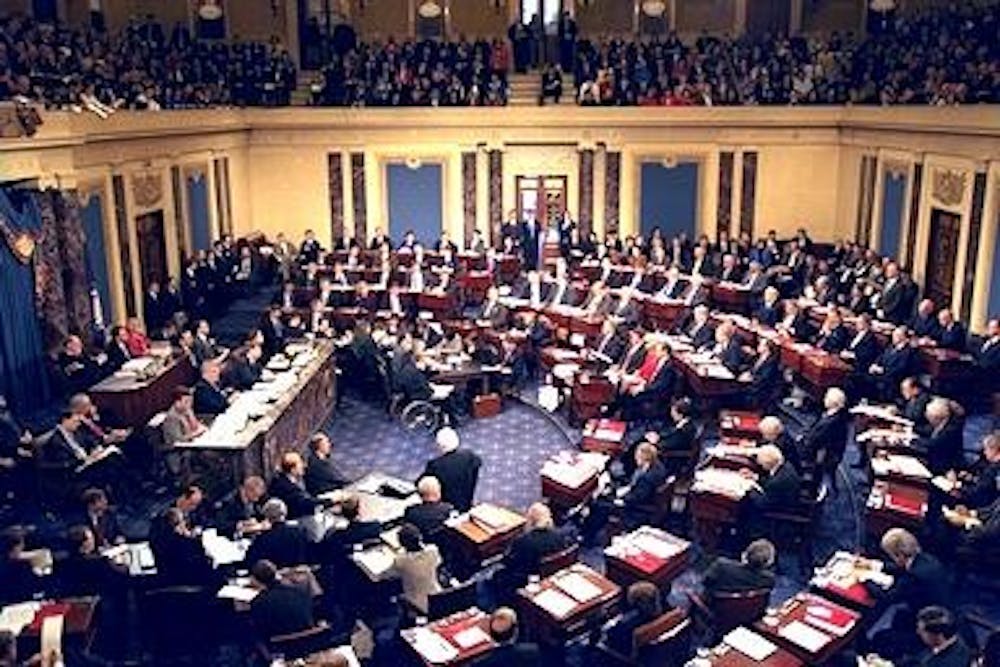Being a moderate is tiring. There are attacks from both ends of the political spectrum; the far left callously groups moderates with the far right as fascists spreading oppression, while the right groups them with the left as anti-American. Even less radical groups will call moderates wishy-washy or spineless.
However, being a moderate is the best way to be objective and fair, especially as students, with our everyday exposure to political matters at Princeton. Although it may be tempting to get washed up in the fires of polarized, divisive thought, being a moderate and being able to think across the political spectrum without prejudice allows us to decide what really is the best course of action.
At Princeton, we are at the forefront of academic and political battlelines. Not only do we study in the same halls where our professors argue about national policies and sociological trends, we also participate in this process by writing our assignments and engaging in lectures and precepts.
Although being at these front lines may allow us to expand our perspectives to beyond what we had known before, they also expose us to polarization. After all, we learn from the first day of our classes that our theses must be supportable and must add something new, and therefore often controversial, to the general academic debate. Indeed, my first-year writing seminar professor told me that I was much too moderate in my first draft. Although the argument was supportable, he said, it did not generate debate, and therefore should be replaced with something more novel and controversial.
Alarmingly, this natural tendency for some Princetonians to have more polarized thoughts leads to prejudice within the campus. Just in the last few weeks, I was surprised by my friends’ prejudicial attitude towards Kavanaugh. Many of them were already adamant that Kavanaugh was guilty and believed that he should not only be disqualified from nomination, but also incarcerated.
My friends thought that accusations of men in power abusing their positions to sexually harass and assault their subordinates meant such abuses happened. Their preconceived thoughts prejudiced them against Kavanaugh and led them to decide that he is guilty until proven innocent, not the other way around.
Prejudice limits our ability to completely — and fairly — analyze events and people. By only seeing what we want to see and allowing the tendency to write more debatable arguments to control what we should feel and act, we cannot look at issues from another angle.
For example, when I told my classmates that the Kavanaugh case should have remained private, as it is a criminal offense under inquiry investigated by the police and by prosecution, my classmates told me that the accusation simply confirmed Kavanaugh as guilty. They could not see my desire to let the justice system do its job; they had already made up their minds about the case.

However, maintaining relative subjectivity, even when exposed to polarizing factors, keeps us on solid ground and allows us to look at the world through a more objective set of eyes. My thoughts on the Kavanaugh investigation were that I needed to be objective in my analysis of both Kavanaugh and his accusers. By being more open to what both sides had to say, I could conclude a more moderate and fact-driven judgement of this case.
It is possible that I simply have classmates who are extremely opinionated about Kavanaugh and that the majority of the Princeton campus is not radical or prejudiced. If such a majority exists, however, it should not be silent. Its moderate and widely-held ideas should still be discussed to add a third voice to the debate between the far ends of the spectrum to balance out the extremes and their possible prejudices. After all, without these moderate viewpoints, argument becomes conflict and ideas turn into dogma.
Daehee Lee is a junior concentrator in molecular biology from Palisades Park, N.J. He can be reached at daeheel@princeton.edu.









